 Grooming Techniques
Grooming Techniques
Regular grooming keeps your doggy friends clean, healthy, and happy. It can prevent yeast infections cause by matted hair, periodontal disease caused by neglected teeth, ear infections from excessive ear wax buildup, and many other ailments.
Below is an overview of the most common grooming procedures. Please consult a professional before grooming your own pet. For more information, check out our FAQ.

If you'd rather have your dog groomed professionally, check out our list of local dog groomers. We also have a list of great resources with more information about dog grooming.
Tools Needed
A variety of tools are required to groom your dog safely and efficiently. To purchase the items listed below, click the item to be directed to a reputable and safe product. Otherwise, ask for help at your local pet store or professional groomer.
- Shampoo - Certified dog-safe and tear-free
- Bristle brushes for short hair dogs
- Slicker brushes for medium to long hair dogs
- Dematting combs
- Scissors
- Nail clippers - Coated scissor style for dogs
- Ear cleaner - Specially formulated for dogs
- Quiet blow dryer
- Towels and washcloths
- Cotton balls or Q Tips
- Pet-safe toothbrush gloves or toothbrush chews
- Bathtub or sink depending on dog's size
- Flea comb/Flea medicine
- Optional but definitely recommended - Treats and toys!
Steps
Dee from Dee's Dog Salon in La Crosse, WI graciously allowed me into her salon for the day to take pictures and interview her on the dog grooming process. If you are interested in professional grooming, Dee's Dog Salon is a wonderful choice! Otherwise follow the steps below to groom your dog at home.
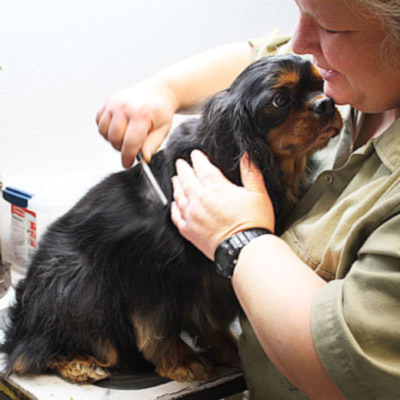
Dee gently brushes and combs Boz, a Cavalier King Charles Spaniel.
1. Brush
Always begin by brushing first. Snip away matted clumps to avoid causing the dog pain while brushing. Begin on their neck and move down the body. The dematting comb can be used to untangle small clumps.
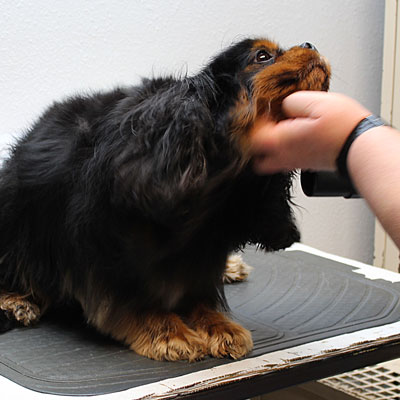
Boz gets praised often. Short breaks keep the animal happy during grooming.
2. Praise
Between steps, the dog should be praised and given treats or breaks.
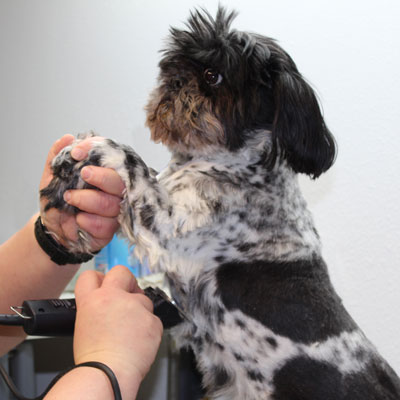
Molly gets trimmed before being bathed. Trimming can be done with electric clippers or a simple scissors.
3. Clip
Necessary clipping and trimming should be done before shampooing and drying. Clip any large amounts of fur at this time.
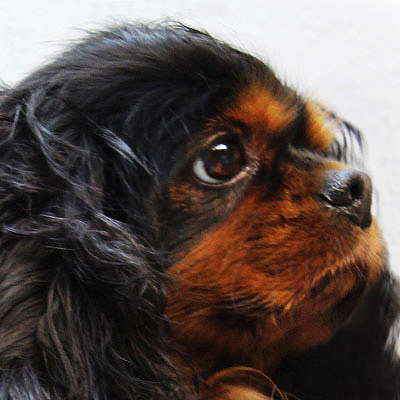
A healthy eye is clean and free of discharge.
4. Eyes
Wipe the eyes clear of any debris with a soft, damp towel. Healthy eyes should be clear and show no signs of irritation. Hair around the eye may need to be clipped at this time. Your vet can do this for you. Do not attempt without professional help.
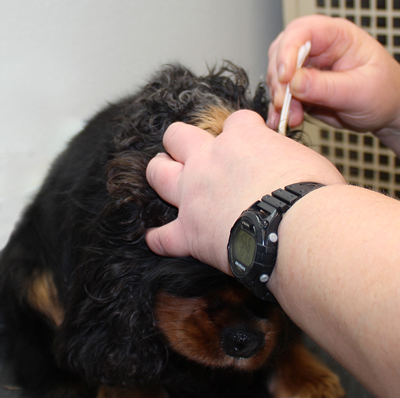
Use q tips or cotton balls to clean your dogs ear, but do not stick any tools into the dog's ear canal.
5. Ears
Clean ears contain some wax and do not have a smell. Ears should only be cleaned if they look especially dirty. Warm any cleaner to body temperature before using, as cold can cause pain in the ear canal. Apply ear cleaning solution to a cotton ball or q tip and wipe the dirt and wax from the inner ear. Do not rub vigorously or travel too far into the ear. If your dog’s ear looks swollen, red, irritated, blackened, shows any sores or discharge, or smells bad, call your veterinarian.
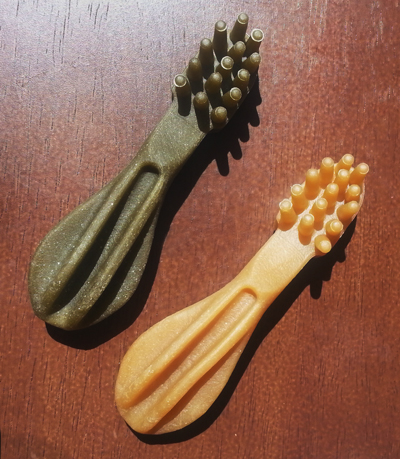
Toothbrush chew bones are also a great alternative for keeping your dog's teeth healthy.
6. Teeth
Try to brush your dog’s teeth around 2 to 3 times a week. Dogs usually prefer pets’ toothbrushes that are a glove with bristles attached to the thumb and forefinger, but you can also spray the mouth with a pet-safe anti-microbial spray. Be gentle. DO NOT use human toothpaste. Veterinary cleaning may be needed if you see a considerable amount of buildup and plaque.
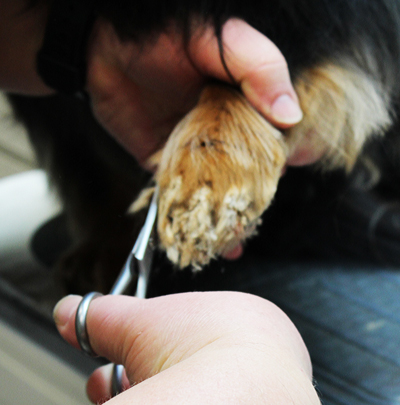
Boz has long hair, so his feet are trimmed prior to cutting his nails. The nails should be mostly visible before they are cut.
7. Nails
Depending on the dog, this needs to be done once a week to once a month. Make sure to trim any extra hair around the feet on long haired dogs. This avoids the hair being caught and pulled by the nail clippers. Take off only a small amount of the nail. Corn starch or styptic powder can be applied with a bit of pressure to stop any bleeding in this case. Be careful to not clip into the blood vessel in the nail. If the case is severe, take your dog to your veterinarian immediately.
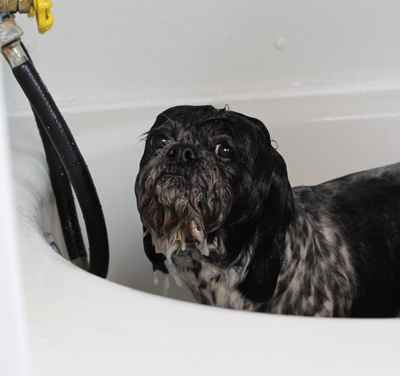
Molly looks slightly indignant as she is shampooed and bathed in a large bathtub.
8. Bathe
Some dogs do not enjoy being bathed, but it cannot be avoided. Just try to keep them as comfortable as possible. Take care to comfort your dog and allow breaks if they are scared by the water. Make sure the water is not too hot or too cold. Take off your dog’s collar and get them into the tub. Spray the dog with warm water only, avoiding the eyes. Thoroughly wet down the dog and apply shampoo to the neck downward. Thoroughly rinse.
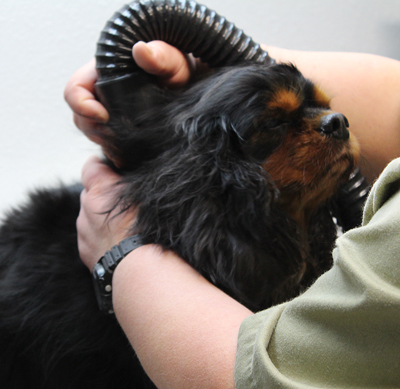
Boz is being dried with a hose attachment from a quiet dryer. As long as the dryer is quiet, most dogs enjoy being blow dried.
9. Dry
Towel dry to the best of your ability. Long hair dogs may require blow drying. Take note to make sure feet are dry to prevent fungus growth. The ears should be protected with your hand to avoid hearing damage.
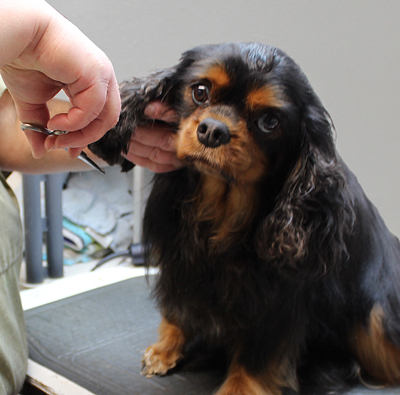
Lastly, Dee finishes trimming Boz.
10. Finishing Touches
Finish trimming your dog. Most short hair dogs will be done at this point, but long haired dogs can be clipped into more elaborate styles. Any decorative stuff can be used at this time, too, such as hair bows or ribbons. You can also buy dog-safe hair chalk to temporarily dye their fur.
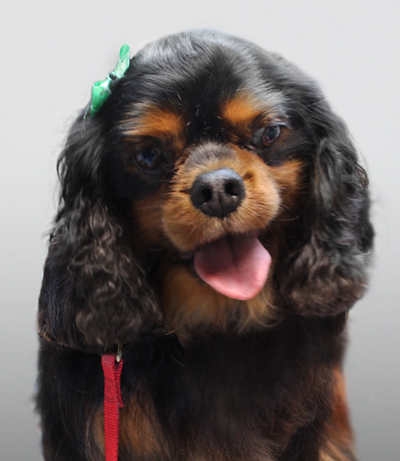
Boz is happy and clean after he has been groomed.
11. Done!
Now you should have a sparkling, happy pup. Watch with delight as they run off and immediately pursue something dirty to rub themselves on.
